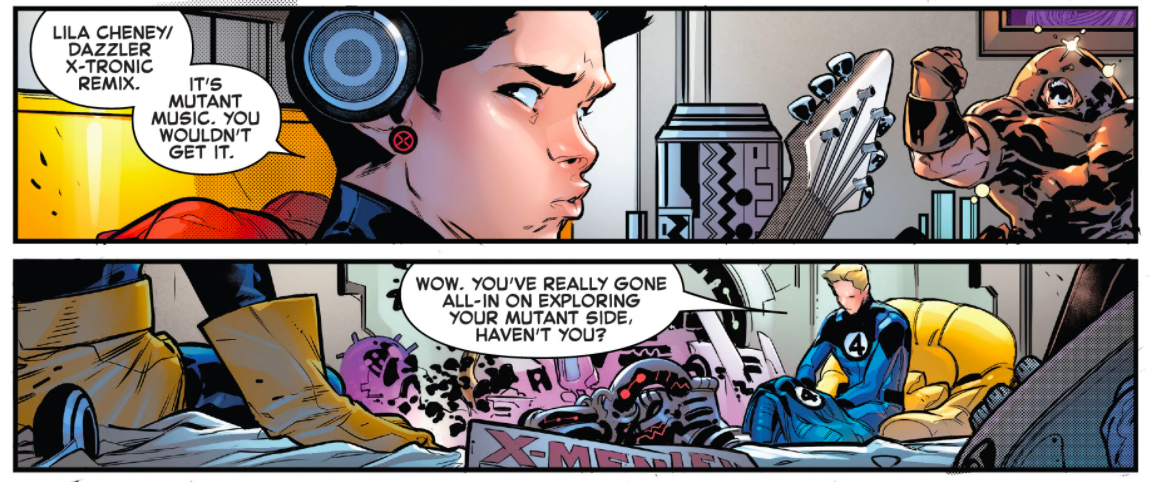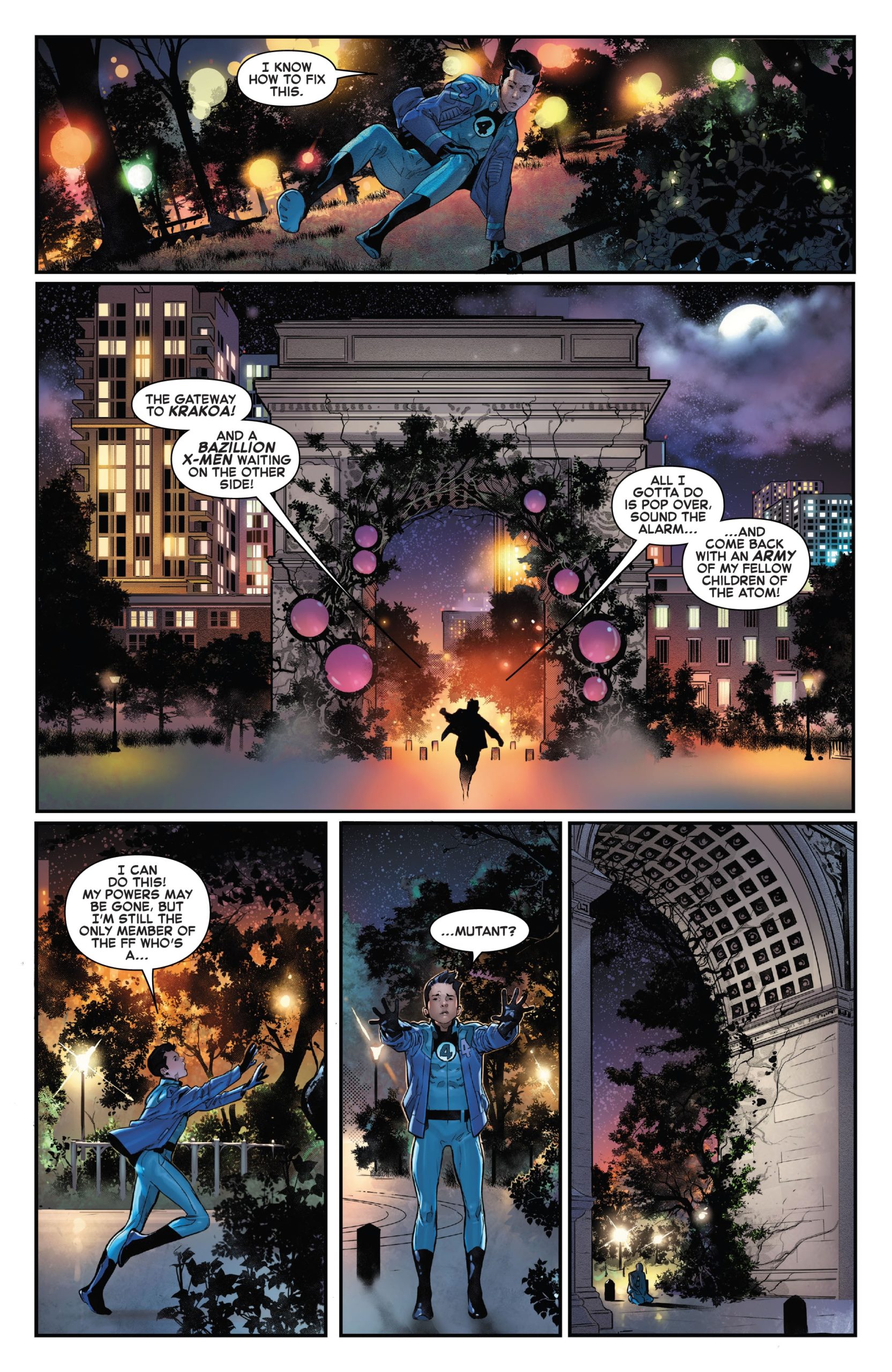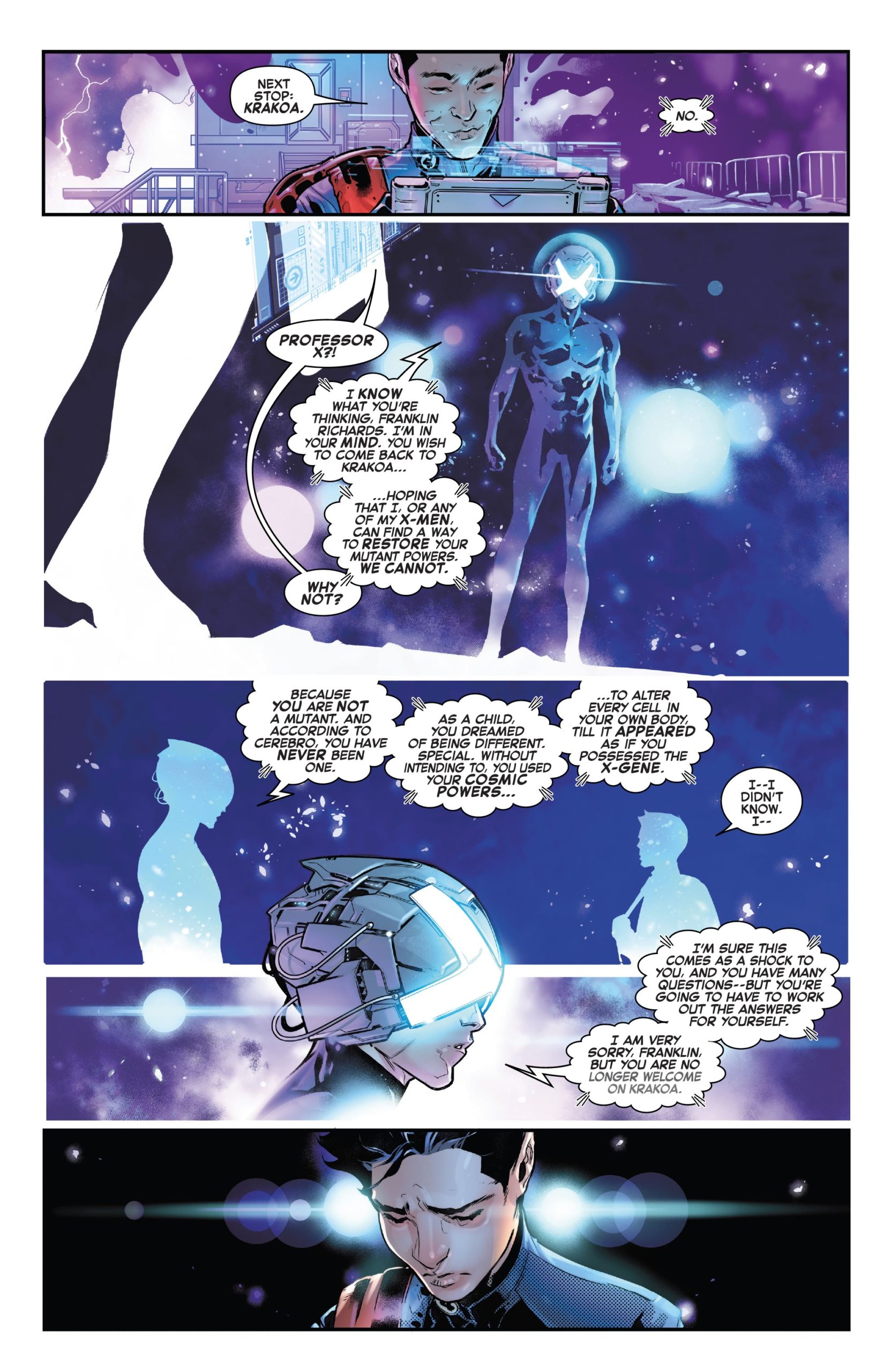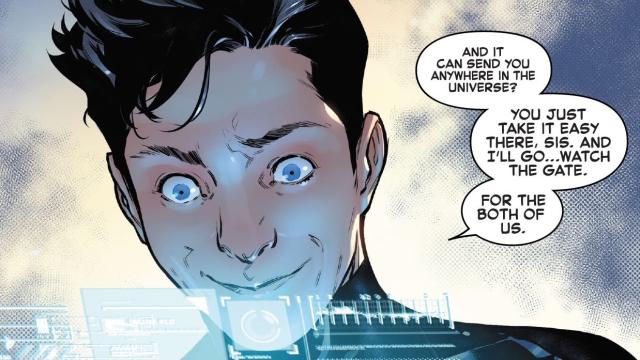Way back at the very beginning of Marvel’s Dawn of X, the Fantastic Four and members of the newly founded mutant nation of Krakoa crossed paths in a fateful, chance encounter that underlined just what it is about this new mutant age that scares the rest of the world so much. That subsequent tension between the Fantastic Four and the X-Men was one of the most promising elements of this new era for both teams’ comics, but pretty much all that potential was done away with in just a few surprising panels in this week’s Fantastic Four #26.
The issue — from writer Dan Slott, with art by R.B. Silva, colours by Jesus Aburtov, and letters by Joe Caramagna — reminds us there’s been a lot more happening lately than we realised. While the rest of mutantkind has been rather preoccupied with a sword-themed, magical contest of champions that will determine the future of reality itself, Franklin Richards has been spending more and more quality time with his biological family of super scientists. Part of the reason being that his innate reality-manipulating abilities have been waning for some time.

Though Franklin’s power to reshape reality at will was once thought to be near-limitless, in Marvel’s recent comics, each time the moody teenager’s willed a new universe into existence, a small part of that power left him. In addition to becoming much more careful about when and how he uses the ability he now sees as a finite resource, Franklin’s also become much more insistent on embracing his mutant identity however he can. For instance, in Fantastic Four #25, a sulking Franklin remarks that people like his uncle Johnny wouldn’t understand “mutant music” like Lila Cheney and Dazzler’s. It’s Slott’s attempt to tap into the age-old mutant-as-minority metaphor by framing mutant culture as something distinct and discrete that Franklin claims as part of his identity.

Fantastic Four #25’s “mutant music” raised the very interesting question of whether it’s merely music made by mutants or a wholly new genre of music that, like blues, jazz, and hip-hop before it, is the creation of a persecuted minority community that turned its existential struggles into art. For a character as knowledgeable as Franklin, everything about his sudden fondness for all things mutant — the music, his X-Men earring, and his collection of action figures — felt rather shallow within the larger conversation about the X-Men and the Fantastic Four both staking claim to him and his sizable powers.
The question about whether Franklin would choose to remain with the Fantastic Four under his father’s strict supervision or set off for a new, virtually immortal life on Krakoa with the world’s other mutants was answered quite quickly in that very same issue: He ended up burning through the last bit of his powers with a single punch. After exhausting his stores during a fight with a being known as the Cormorant, Franklin finds that he’s no longer able to pass through the Krakoan gateways that allow mutants — and mutants only — to travel to the island. Even without his power, Franklin’s x-gene should have ensured him safe travel through the gate, but much to his surprise at the end of issue #25, that was not the case.
The biggest question surrounding Franklin heading into issue #26 was just what exactly happened to him. This isn’t the first time one of Marvel’s most powerful mutants has suddenly found themselves stripped of their fantastical strengths, and everything about the character’s development as of late has pointed to his being the focal point of a long-simmering “familial” conflict between the X-Men and the Fantastic Four. But Slott’s script seemingly puts an end to the Franklin-as-Mutant saga in the midst of a story that spends an odd amount of time emphasising that many people see Franklin as a sort of god.

As Franklin mopes about becoming a “normal” person, his sister Valeria commits her sizable intellect to figuring out a way of controlling the Fantastic Four’s Forever Gate. The device can transport people to any singular physical point in creation and Valeria’s ability to work through the complex maths necessary to understand it — maths that her father couldn’t wrap his mind around — brings her no shortage of joy. But to Franklin, his sister’s discovery is an opportunity to regain what he’s lost.
Though none of the Krakoan gates will accept Franklin willingly, he reasons that he might be able to use the Forever Gate to return to where the X-Men would assuredly figure out what’s happened to him and how to restore his x-gene. Before he has a chance to take matters into his own hands, he’s met by one of Charles Xavier’s psychic projections that explains a strange, devastating truth to him: Franklin was never truly a mutant; he was simply a boy with immeasurable power who wanted to be even more special and unique than he already was. So great was that desire, that he was able to make it a reality, but without Franklin’s powers, the ruse all fell apart.
Again, this is far from the first time that one of Marvel’s heavy-hitting mutant’s been depowered, but the entire situation with Franklin’s raised a certain amount of concern among fans who’ve seen parallels between this development and the stories of people like current Marvel Comics editor-in-chief C.B. Cebulski, Rachel Dolezal, and disgraced professor Jessica Krug, all of whom are white people where were exposed pretending to be people of other races for access, status, and personal gain. The whole issue is made that much weirder as people from the newer universes Franklin created with his family come into the story and explicitly refer to Franklin as their maker. It’s technically accurate, yeah, but it just reinforces this idea that he’s a god-child born to one of the world’s most famous, powerful scientists, and he felt the need to pretend to be a minority.
When you look back at Franklin Richards’ history as a character, it’s glaringly and immediately obvious that the boy’s always been a very particular kind of embodiment of narrative legacy privilege — the same kind of privilege afforded to other characters like Rachel Summers and Cable, or DC’s Damian Wayne and Jonathan Kent. Characters like these are born to popular legacy characters and are almost always given ridiculously outsized powers and skill sets that are more than the sum of their parents’ genetic contributions. These characters also tend to be the focal points of melodramatic twists of fate, the most common being the character’s birth, as was the case in Fantastic Four Annual #6, when the team journeys into the Negative Zone to find Annihilus’ Cosmic Control Rod, a device necessary to ensure the Invisible Woman could deliver baby Franklin safely.

The Fantastic Four may no longer be the stars they were during the Golden and Silver Ages of comics, but infant Franklin was anything but a persona non grata even before he was first officially identified as a mutant. Similar to Wanda and Pietro Maximoff, Franklin’s newfound non-mutant status comes both rather suddenly and seemingly for no reason other than to pull the character out of the X-Men’s orbit. But the Maximoff twins’ new classification felt more like Marvel attempting to get the comics characters into a position that would better reflect their cinematic counterparts. The truth about Franklin smacks of an uncomfortable weirdness that, in a certain light, does make the character out to be an entitled impostor who spent his life masquerading as a mutant because he wanted to be one.
Given the larger conversations more people are having about what it means to claim ownership of one’s identity, and recognising the difference between appreciating the cultures of others vs. cultural appropriation, Fantastic Four drops at a time when it’s hard not to see where the criticism comes from.

Comments